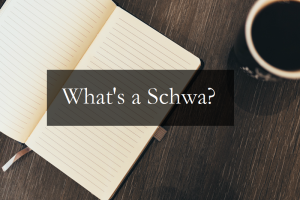A fascinating word: Schwa—a word for what is said to be the most common sound in the English language.
Schwa:
- Is represented by the phonetic symbol /ə/ (an upside-down e)
- Typically occurs in unstressed syllables in English
- Sounds like ‘uh’
Any vowel can be pronounced as schwa, and the pronunciation can change depending on whether the syllable it is in is stressed or not. E.g. man and woman. Notice that the second syllable of woman is the unstressed syllable, and the letter ‘a’ is pronounced as schwa, whereas in the word ‘man’, it is not.
Some examples of schwa:
A – again | vitamin | about | adept | America | a
E – petition | celebrate | synthesis | excellent | the
I – president | experiment | decimal
O – occur | condition | love | eloquent | harmony | mother
U – campus | support | cut | sun | truck | stuff | supply | medium
Y – syringe
Ai – mountain
Oe – does
Ou – you
Ough – thorough
Er – weather | father | mother
How accents affect Schwa
There is some variation with different accents, and sometimes it seems to depend on the sentence you’re using the word in (e.g. ‘You’ could be pronounced /yu/ or ‘yoo’ as in “You and I”, or /yə/ or ‘yuh’, as in, “when you get here”. Even with this last example, it could be pronounced /yu/ if you spoke slowly, placing stress on the word ‘you’, but not if you are speaking at normal speed and the ‘you’ is unstressed.
In words with more than one syllable, not every syllable is given equal emphasis when spoken. Three levels of syllable stress are possible:
- stressed
- secondarily stressed
- unstressed
Every multi-syllable word has a single stressed syllable. The single stressed syllable of the word has the most emphasis. The remainder of the syllables may have a secondary stress or may be unstressed.
The word emphasize has all the levels of stress. The first syllable is stressed, the second syllable is an unstressed syllable pronounced as schwa, and the third syllable has a secondary stress.
As I researched different words that were identified as containing the schwa sound, I came to the conclusion that some people would not agree. English speakers from different countries have different accents, and the way we pronounce certain words is not always the same. The examples I’ve given here, I believe, are reasonably relevant for New Zealand accents.
For further reading and more detailed information, this is an interesting link I found:
A Maverick Vowel: The Notorious /ə/ (Schwa) by Richard L. Brown
http://www.cervantesvirtual.com/servlet/SirveObras/12715753131277171865624/p0000027.htm

